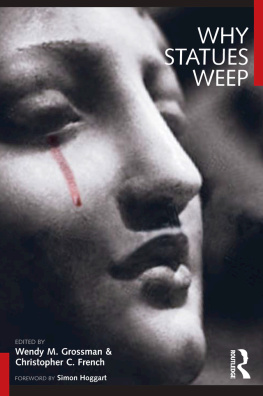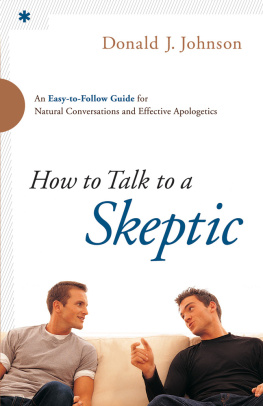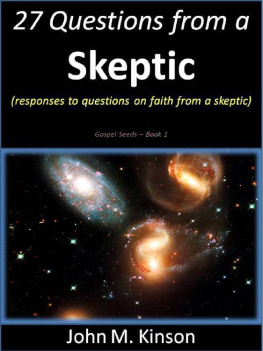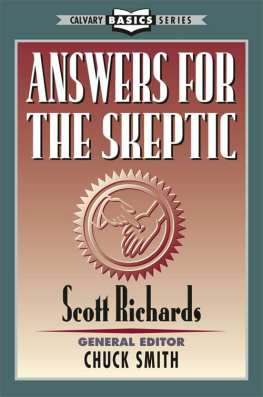Why Statues Weep
Why Statues Weep
The Best of The Skeptic
edited by
Wendy M. Grossman
and
Christopher C. French
First published 2010 by The Philosophy Press, an imprint of Acumen
Published 2014 by Routledge
2 Park Square, Milton Park, Abingdon, Oxon OX14 4RN
711 Third Avenue, New York, NY, 10017, USA
Routledge is an imprint of the Taylor & Francis Group, an informa business
Editorial material Copyright The Skeptic Magazine, 2010.
Copyright for each contribution remains with its author.
All rights reserved. No part of this book may be reprinted or reproduced or utilised in any form or by any electronic, mechanical, or other means, now known or hereafter invented, including photocopying and recording, or in any information storage or retrieval system, without permission in writing from the publishers.
Notices
Practitioners and researchers must always rely on their own experience and knowledge in evaluating and using any information, methods, compounds, or experiments described herein. In using such information or methods they should be mindful of their own safety and the safety of others, including parties for whom they have a professional responsibility.
To the fullest extent of the law, neither the Publisher nor the authors, contributors, or editors, assume any liability for any injury and/or damage to persons or property as a matter of products liability, negligence or otherwise, or from any use or operation of any methods, products, instructions, or ideas contained in the material herein.
British Library Cataloguing in Publication Data
A catalogue record for this book is available from the British Library
ISBN 13: 978-0-9537611-2-8 (pbk)
Typeset by Domex
Cover design by Paul Cooper
Contents
| by Simon Hoggart |
| by Wendy M. Grossman |
| (Wendy M. Grossman) |
| (Susan Blackmore) |
| (Richard Wiseman and Emma Greening) |
| (Charles Paxton) |
| (Kevin McClure) |
| (Wendy M. Grossman) |
| (David Hambling) |
| (Andrew Brice) |
| (Barry Beyerstein) |
| (Alan Hunt) |
| (Paul Chambers) |
| (Wendy M. Grossman) |
| (Martin Hempstead) |
| (Robert McGrath) |
| (David Clarke) |
(Susan Blackmore
and David T. Patton) |
| (Wendy M. Grossman) |
| (John Diamond) |
| (Donald Rooum) |
| (Thurstan Brewin) |
(Mark Pendergrast) |
| (Chris French) |
| (Wendy M. Grossman) |
| (David Langford) |
| (David Berman) |
| (Chris Willis) |
| (Donald Rooum) |
| (Edzard Ernst) |
| (Tony Youens) |
| (Wendy M. Grossman) |
| (Susan Blackmore) |
| (Chip Denman) |
| (Nick Rose) |
| (Donald Rooum) |
| (Wendy M. Grossman) |
| (Ray Hyman) |
| (Steve Donnelly) |
| (Lucy Sherriff) |
| (Michael Hutchinson) |
| (Wendy M. Grossman) |
(Anthony Garrett) |
| (Lucy Fisher) |
(Gerald Woerlee) |
(Martin S. Kottmeyer)> |
| (Wendy M. Grossman) |
(Dr Peter May) |
| (Lewis Jones) |
| (Richard Wiseman) |
Perfectly intelligent, thoughtful people often have two reactions to accounts of the paranormal. They either say, 'Well, there must be something in it ... I can't think of any other explanation', or they ask why it matters. Isn't it all a bit of fun?
And it can be tricky for the average skeptic. 'I went to a spiritualist, and she knew that my uncle had died recently, and that when I was a teenager I broke my leg so I couldn't go skiing! I bet you can't explain that!'
And we or most of us are raised to be polite, so we don't say what we should, which is, 'Oh, come on, did she really know your uncle had just died, or did she say "I see death, I see grief ..." And she knew you broke your leg, did she? Or did she say that she detected a broken bone in your past, and that had led to disappointment?' What kid doesn't break one limb or another and find they miss some kind of treat?
Or you could ask what she got wrong. Like the way she kept saying that she saw a Kevin in your life, and you couldn't think of anyone called Kevin except that lad who sometimes works Saturdays in the greengrocers. Or the time she said she saw romantic bliss, and you thought no, you weren't getting on well with your partner. You didn't remember that bit, did you?
But on the whole we don't say that. And even when we do nobody thanks us for it. I wrote an article years ago in which I analysed a TV performance by the late Doris Stokes, who claimed to hear messages from the dead. At one point she guessed that a youth who'd died had suffered a heart attack. Told that he was actually killed in a motorcycle crash, she smoothly declared that he had had a heart attack just before the accident. Then, discussing a little boy who had died in hospital, she thought he was still alive. And her interlocutor was not his mother, but his aunt. When I pointed this out in the article, the aunt wrote an angry letter pointing out that she had got his hair colour right, and that Mrs Stokes's words had been a great comfort to the family.
I'm sure they were. No wonder, since as well as using cold-reading techniques Mrs Stokes often simply fed back to the families information she had already got from them. People would phone her and get her husband. They would pour out their troubles to him, he would promise them free tickets for her next appearance in their area, and she would present the information back to them as if it had been provided by spirit voices.
Few in her audience ever said, 'Excuse me, I told your husband all that a few weeks ago!' People were in great distress. They were desperate to hear something that implied that their loved ones were happy in the afterlife. The fact that they were being spoon-fed lies, fictions, and evasions didn't matter to them. Like all of us, they preferred to clutch at hope rather than drown in despair.
So why does it matter? Perhaps we shouldn't mind. Mysteries are great fun. It's much more beguiling to think that space aliens travel across the cosmos for hundreds of our earth-years and, on arriving in Britain, decide to trample the crops in artistic circles before starting back on the long journey home. Far more interesting than putting it down to local pranksters. We all want some kind of assurance that the things that go wrong in our lives are not our fault. What better than to blame the heavens? You get fired. A partner leaves you. Someone close tells you exactly what they think of you. How soothing to learn that it has nothing to do with your failings!
'Mars in the ascendant prefigures difficulties at work ... Geminis are liable to have romantic problems... Scorpios are startled by close friends ...' Again, many people just say that astrology is a bit of fun, but plenty of people attach great weight to it. (Nancy Reagan did, and made sure that her husband, the president, took key decisions at 'propitious' times, including signing bills at midnight.)











